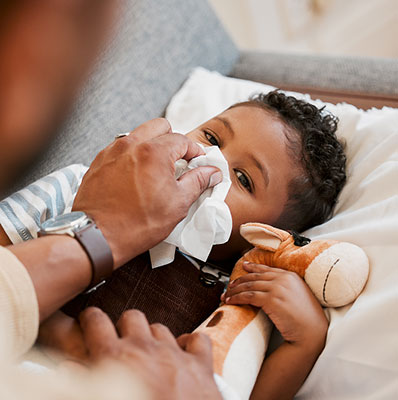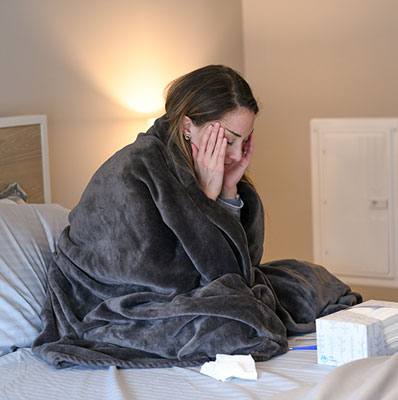How Long Is the Flu Contagious?

January 17, 2023
Updated: 08/31/23
Fever, body aches, fatigue – flu symptoms can range from person to person but come on quickly and leave you exhausted and feeling miserable.
Our expert, Nora Tossounian, M.D., internal medicine physician at Hackensack University Medical Center, weighs in on how long a person is contagious for and how to prevent the flu from spreading.
“We need to remain vigilant this year and do all that we can to keep ourselves and loved ones healthy and safe,” says Dr. Tossounian. Coupled with the circulation of COVID-19 and RSV, this upcoming flu season presents the “tridemic” challenge, and safety precautions shouldn’t be taken lightly.
How Does the Flu Spread?
The flu mainly spreads from person to person when an infected person coughs, sneezes, or talks, spreading tiny respiratory droplets containing the virus. Some particles may remain airborne, only for others to inhale and become infected. “You can get the flu from surfaces, but it is less likely,” says Dr. Tossounian.
How Long Are People Contagious?
People with the flu are most contagious three to four days after the illness begins. However, some people may shed virus one day before symptoms appear and up to seven days after becoming sick. People with weakened immune systems or young children may be contagious even longer.
How to Prevent the Flu
It's hard to know where the flu might be lurking, but there are numerous things you can do to help prevent the spread of it:
- Get vaccinated. The composition of the flu vaccine is updated every year to best match the virus for the upcoming season. The Centers for Disease Control and Prevention (CDC) estimated that those who were vaccinated last season were 40 to 70% less likely to be hospitalized from the flu.
- Avoid contact with sick people, and stay home if you are sick. “Remember, the flu spreads mainly from person to person, so isolating the sickness can help everyone,” says Dr. Tossounian.
- Cover your nose and mouth with a tissue or elbow when you sneeze or cough. This is a good practice to help prevent the spread of all kinds of germs. But it can thwart the spread of the flu especially if you’re unaware you are sick.
- Wash your hands frequently for 30 seconds. You can also sing “Happy Birthday” twice to time it right.
- Avoid touching your face. Your face has many orifices and mucus membranes that are easy entry points for unwanted microbes.
- Practice healthy habits such as eating right, exercising and getting quality sleep. These habits contribute to a healthy and robust immune system, and will help combat viruses such as the flu.
“Viruses are a part of life, so they can’t be ignored. But if everyone stays alert and does their part, we will have a much better chance at keeping everyone healthy and safe throughout the cold and flu season,” says Dr. Tossounian.
Next Steps & Resources:
- Meet our source: Nora Tossounian, M.D.
- To make an appointment with a primary care doctor near you, call 800-822-8905 or visit our website.
The material provided through HealthU is intended to be used as general information only and should not replace the advice of your physician. Always consult your physician for individual care.






